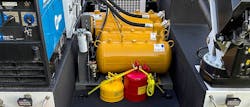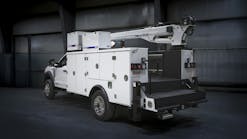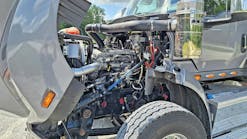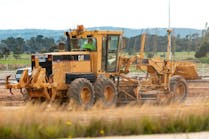Field Service Provider Combines Telematics, Mobile Lube Systems
As telematics integration works its way across the equipment manufacturing sector, a common issue many fleet managers face is learning how to incorporate different telematics platforms and developing ways to use all the data to care for their assets.
Employing telematics seems like an overwhelming task for many companies with a wide range of equipment and vehicles in their fleet. Most are trying to navigate a shortage of skilled labor for service technicians while juggling busy workloads.
Chris Britt and Ed Heinz, founders of Mobile Equipment Service Options (MESO), recognized that while telematics could help companies maximize the life of their equipment, most fleet managers didn’t have the time to do it all themselves. So, in 2014, MESO started as a mobile service company that monitors the health of its customers’ equipment fleets and proactively provides field service when needed.
Helping fleet managers
“For most companies with a large fleet of equipment, it’s more efficient to hire out preventive maintenance and on-the-job service/repair work," said Britt, president/CEO of MESO. "But unfortunately, most fleet managers still require some manual internal tracking for the company, and a phone call. Ed and I knew there had to be a better way. What if fleet managers didn’t have to keep track of machine hours/mileage? What if they didn’t have to schedule service? What if we could use our customers’ machine telematics to simplify the whole process for them?”
Of course, to capitalize on all equipment data and make their business concept a reality, MESO’s founders also understood they needed field-efficient service vehicles, which included a mobile lube system that would allow their team to perform routine fluid exchanges as quickly and cleanly as possible.
Britt and Heinz tested their business concept when they opened their first location in East Liverpool, Ohio, and deployed the first service truck. This new technology-driven service model quickly gained market acceptance, and MESO has expanded its operating territory beyond Ohio into Georgia, Indiana, Kentucky, Pennsylvania, Tennessee, Texas, and West Virginia.
“We’ve had to spend a lot of time perfecting the process of collecting equipment telematics data," Heinz said. "We also had to develop software processes for our service technicians to communicate quickly and efficiently with fleet managers, so they still have 100 percent ownership of all the work we’re doing on their behalf. And finally, we had to work on our own fleet of equipment to ensure our highly skilled field technicians had everything they needed to perform their job to the highest of standards in the shortest amount of time possible."
While using Internet of Things (IoT)-based technology is the future of their business, M.E.S.O. understands that when their service technician arrives at a site, the clock is ticking.
“While we try to work around the schedules of our customers, the first question we usually get asked onsite is, ‘How long will a piece of equipment or truck be down?'” Britt said. “We understand any downtime is wasted time and impacts profitability. Our goal is and always will be to keep service times to a minimum. To make that happen, we have explored all the different ways to perform oil changes and top off fluid levels, since those are the most common preventive maintenance needs.”
Britt and Heinz were looking for mobile lube systems at the time of Conexpo 2017.
“We were just on the tail end of winter, and several of our service technicians were concerned about how some of their piston pump lube systems were performing in the cold weather,” Britt said. “They were running slow, and in some cases, freezing up in the extreme cold. Compounding the issue with our current mobile lube systems was access on some job sites. The systems’ hoses weren’t long enough, and, in most cases, we couldn’t pull our trucks up closer to the machine.
Finding the mobile lube system
“What we saw in the Sage Oil Vac was different, though,” Britt said. “They designed mobile lube systems that use air to drain and refill fluids. This type of design eliminates the possibility of a pump freezing up and can efficiently pump fluids over longer distances since hose capacities are not limited by the size of the pump involved.”
MESO started with a 5120V Heritage Lube Skid with a 120-gallon waste tank, four, 80-gallon fresh oil tanks and a 50-foot hose reel. After using for a few years, Britt and Heinz added to their fleet with a custom lube skid build with a 60-gallon (227-L) waste oil tank, two, 30-gallon (114-L) fresh oil and grease tanks and a 50-foot hose reel. Since then, MESO has added eight additional Sage Oil Vac mobile lube skids with similar configurations, and plans to add at least one additional system every month through 2022. These custom lube systems have a low-profile design and a separate reel cabinet.
“We decided to go with a skid-mounted system because we tend to swap out trucks more than we need to replace lube systems,” Britt said. “A low-profile system was also an important aspect for us since we like to be able to have an enclosure over the top of the truck bed. The team at Sage Oil Vac worked with us through the process and came up with a customized system to match our specific needs.”
One unique request MESO had was designing a lube system where the hose reels could be mounted separately from the skid with the waste oil tank and fresh oil tank. “The MESO team wanted to give their service technicians the ability to access the hose from the side of the truck bed, instead of from the back,” said Chance Castillo, corporate sales manager for Sage Oil Vac. “After meeting with their team, we developed a new lube system configuration that would accommodate this request. In addition to allowing the reels to be mounted separately, this design keeps the skid profile as short and low as possible so they can maximize the usage of all available truck bed space.”
After putting their fleet of mobile lube systems out in the field, they realized several other benefits of the system's design.
Addressing the labor shortage
“It is extremely competitive right now to hire and retain skilled service technicians,” Britt said. “I believe equipping our service trucks with best-in-class equipment like Sage Oil Vac lube systems has helped us retain our service technicians and hire more qualified individuals. With the Sage Oil Vac system, oil changes are safer and less labor intensive, with less mess than traditional methods. This adds up to our service technicians being able to do more work efficiently and safely each day. Furthermore, the whole process is much cleaner than traditional methods, so our guys go home with cleaner shirts, pants, and hands. Who doesn’t want a job like that?”
Source: Sage Oil Vac





